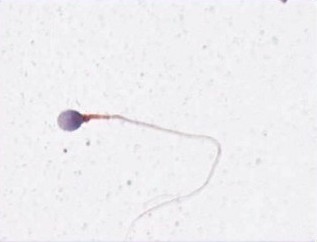
The spermogram is the first-line test for male infertility. It assesses the macroscopic and microscopic characteristics of the sperm.
It should be carried out in the laboratory after 2 to 5 days of abstinence. The analysis must be carried out within one hour of ejaculation.
The spermogram assesses the characteristics of the spermatozoa according to :
Interpretation Lower reference limits (WHO 2010) :
| Sperm parameters | WHO standards |
| Sperm volume (mL) | >= 1,5 |
| pH | >= 7,2 |
| Sperm concentration (Millions/mL) | >= 15 |
| Total sperm count in ejaculate (Millions) | >= 39 |
| Total mobility* (%) | >= 40 |
| Progressive mobility** (%) | >= 32 |
| Vitality (%) | >= 58 |
| % of sperm with normal morphology*** (%) | >= 4 |
Spermocytogram
The spermocytogram is the analysis of sperm morphology that is inseparable from the spermogram. Morphological analysis using the modificated David classification involves analysing at least 100 spermatozoa.


Interpreting spermogram results
There are different results to be obtained from a sperm analysis. Here are the interpretations:
Normozoospermia: normal sperm
Hypospermia: Decreased volume of ejaculate
Aspermia: absence of ejaculate
Leukocytospermia: the presence of white blood cells in the ejaculate >1 Million
Haemospermia: Presence of red blood cells in the ejaculate.
Oligozoospermia: Decreased sperm concentration.
Asthenozoospermia: reduced sperm mobility.
Necrozoospermia: Decreased sperm vitality.
Cryptozoospermia: the presence of spermatozoa after observation of the centrifugation pellet.
Azoospermia: absence of spermatozoa after observation of the centrifugation pellet.
Teratozoospermia: decrease in the number of typical spermatozoa.
Oligoasthenoteratozoospermia: Decrease in the concentration, mobility, and morphology of spermatozoa.
Spermogram monitoring
In all cases where the spermogram has changed, it should be checked again 3 months later.
This is because the spermogram is an examination that can vary due to a number of factors, such as a fever in the 3 months prior to the examination or taking medication. So if the results are abnormal, don't panic!
Written by:
Dr Alexandra Mesner,
Medical biologist specialising in reproductive biology,
Le Vésinet Laboratory, Associate Practitioner at the Foch Hospital